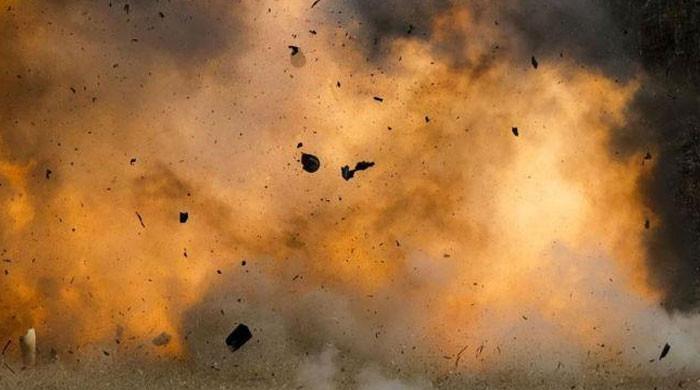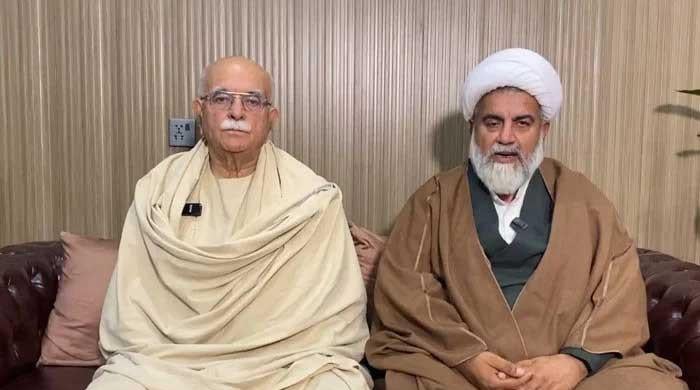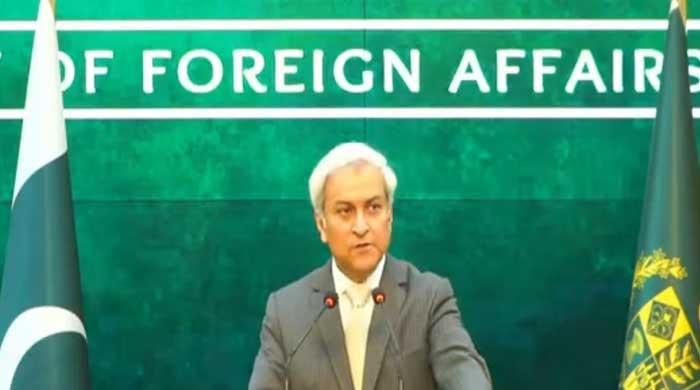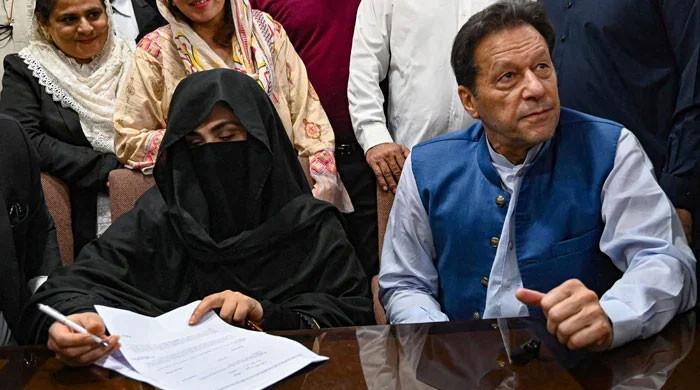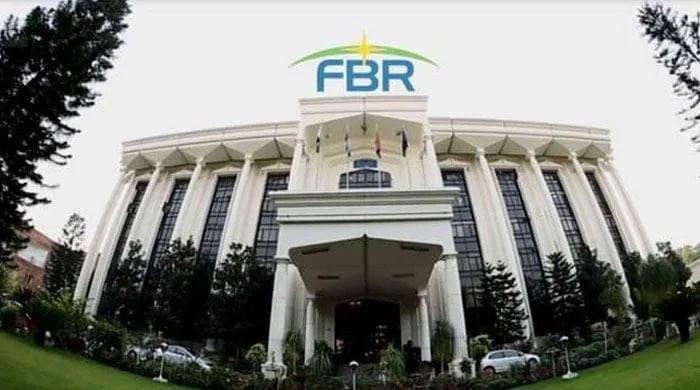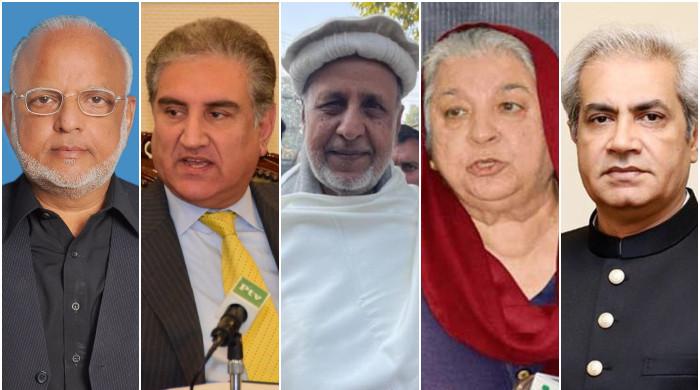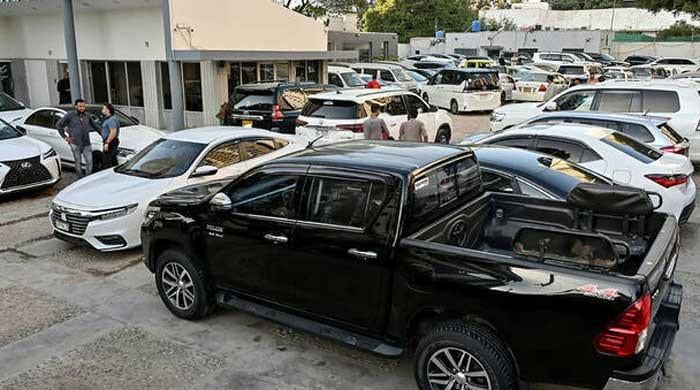We are facing an armed struggle in Balochistan, PM Kakar tells IHC
Caretaker PM Anwaarul Haq Kakar says armed individuals are fighting to “create a new state”
February 28, 2024
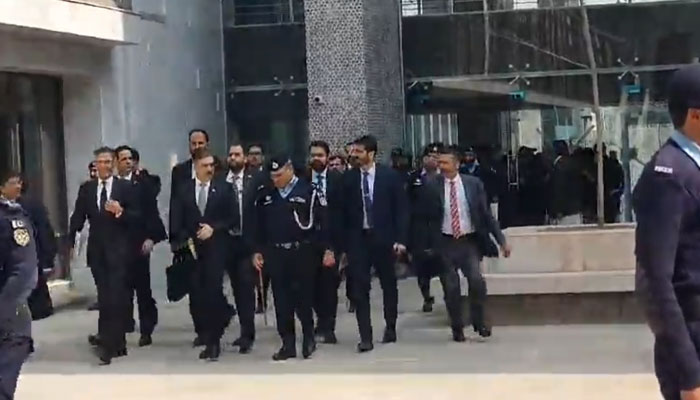
- Premier says armed individuals fighting to create "new state”.
- PM asserts state must deal differently with armed people.
- "No court is asking to protect non-state actors," Justice Kayani says.
ISLAMABAD: Caretaker Prime Minister Anwaar-ul-Haq Kakar on Wednesday told the Islamabad High Court (IHC) that the government is facing an armed struggle in Balochistan, asserting that the armed individuals are fighting to “create a new state”.
The premier said that the government is working according to the Constitution and law on the issue of enforced disappearances.
PM Kakar said the government and ordinary citizens did not take up arms, but it is the responsibility of the state to protect the people.
“The state must deal differently with armed people,” he asserted.
Responding to the premier’s statement, Justice Kayani said: “No court is asking to protect non-state actors.”
He added that there is undoubtedly a war, which our army and institutions are fighting.
The prime minister’s statement came during his appearance before the high court in the missing Baloch students case. This was PM Kakar’s first appearance at the court that summoned him for the third time after he skipped the summons twice.
During the hearing, PM Kakar said that the violations of non-state actors are also recorded, recalling the killing of a former Balochistan chief justice who was heading an inquiry committee pertaining to a relevant issue.
PM Kakar added that the country’s paramilitary forces and counter-terrorism agencies are blamed for the issue. However, he added, no one remembered the violation of human rights when people were burnt alive in a bus on the coastal highway and a Chaudhary or Gujjar are killed after identification by the outlaws.
The premier, when talking about the issue, said: “They don’t want to resolve the issue and that it is not right to consider the entire state criminal because of them.”
It should be noted that the court, during the previous hearing of the case, had formed an inquiry committee comprising the director generals of the Inter-Services Intelligence and Military Intelligence for the recovery of the missing persons.
However, the order to form the committee has been challenged in the Supreme Court.
During his appearance today, the prime minister shared that the families and representatives of the missing person put the number of missing persons at 5,000.
The premier also spoke on the issue of profiling students on a linguistic basis.
“There are deficiencies and flaws in the system, if there is no evidence, how to punish whom?” he added.
The court, after PM Kakar’s remarks, said that there has not been a single statement that someone is in the custody of CTD in the last 24 months.
“The failure of the state institutions is that they could not prosecute them. There is a flaw in the law and there is no evidence, so there is a need to improve it,” Justice Mohsin Kayani noted.
The judge added that the law is the same and has to be followed.
The caretaker premier said it was not the domain of the caretaker government to look into it, but the incoming government will be requested to do so.
11 missing persons recovered so far: AGP
Meanwhile, AGP Awan told the court that the government has made efforts to recover missing Baloch students with at least 11 recovered so far.
The AGP added that nine people are currently in CTD’s custody, four haven’t been traced yet and two are in Afghanistan.
The judge said that the case of missing persons who have entered into the legal process no longer falls in the court’s mandate. “If there are cases against them, the relevant courts will look into it.”
Justice Kayani, when PM Kakar arrived in the court, remarked that the IHC had conducted several hearings of the case in the last two years and that Baloch students were picked up.
“Some people are terrorists, some joined [Tehreek-e-Taliban Pakistan] TTP and some people have reached their homes,” the judge remarked.
However, the judge added, that state institutions have to function as well as be accountable pertaining to the issue.
“If this case has proceeded, people have reached their homes only with the efforts of the institutions,” he remarked, adding that institutions are neither above the law nor are they exempt from it.
The judge insisted that there should be knowledge about those who are arrested.
“If people go missing, accusations are hurled towards the state of Pakistan, which is why we formed a committee consisting the heads of intelligence agencies.”
The premier said that the state’s accountability increases if it considers itself morally superior.
Impression of propaganda incorrect: Lawyer Imaan Mazari
During her arguments, Imaan Mazari — the lawyer representing families of the missing persons — said whenever there is a discussion about missing persons it is drifted towards terrorists.
“It is very painful for the families of the missing persons. The impression that we are doing any propaganda against the state is not correct. We are also part of the same state,” she said, adding that they don’t support terrorism.
Commenting on the progress made in the recovery of missing persons, the court commended the government for bringing down the number of missing persons from 59 to eight.
Justice Kayani said that this case led to many missing persons being traced.
Addressing lawyer Mazari, the judge said: “Your application has been processed, everyone has done their work and role. Those who are in the custody of CTD, their cases will be processed.”
Justice Kayani further mentioned that issuing a judgment was not the problem, the important thing was the return of the people.
“No one ever came to court after being recovered. We have always heard that missing persons do not come to court after recovery,” he remarked.
The court directed CTD to provide the petitioner with details of cases against the people in their custody.
Meanwhile, elaborating on his previous remarks, the caretaker prime minister clarified that he wasn't referring to the families of the victims, but instead was simply expressing his views on another related issue linked with the matter in question.
Furthermore, AGP Awan highlighted that the issue pertaining to the prime minister's appearance before the court is settled after today.
When the lawyer further objected to the complainant's direct response to the prime minister, Justice Kayani called Awan to at least listen to the applicant's point of view further stressing that the applicant was not replying to the premier.
On this, the petitioner's lawyer Mazari continued with her arguments and highlighted that her clients do not support acts of extremism. She further highlighted that the commission's reports do say that state institutions are involved in enforced disappearances.
"I disagree with Mazari's arguments," PM Kakar said, reacting to the counsel's statement.
Upon hearing the arguments, the court said that it would now take action and would seek a response from the relevant committee that deals with the intelligence agencies.
To this, the prime minister contended that the government believes the relevant authority in this regard lies with the executive, further adding that the government has already challenged the court order over the matter in question.
During a media talk outside the court, the premier said he did not defend enforced disappearance.
“I have defended the charges against the state in the name of enforced disappearance,” he said, adding that the government will inform the media once the inquiry is complete.
More to follow...




